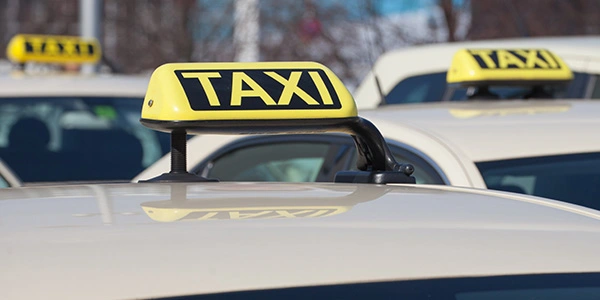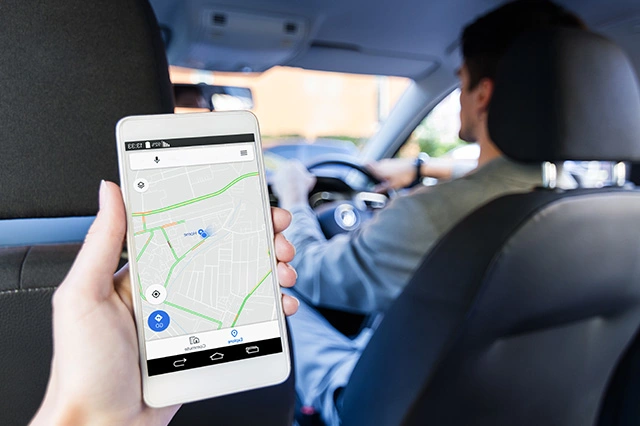What is Taxi Insurance?
To anyone researching options for cheap taxi insurance, it won’t come as too much of a surprise to hear that most taxi insurance policies are more expensive and slightly more complex than your standard car insurance policy. You’re on the road all day or night, you’re carrying strangers to sometimes unknown locations, it’s a high-risk job when it comes to motoring accidents. For this reason, it’s really important that you fully understand your options and are able to compare the benefits and potential drawbacks of the policies you look at.
It’s always advised to compare policies and check for exclusions or specialist terms before you commit. Your hire and reward taxi business is your livelihood, so it’s really important that it’s covered properly.
How our process works
We’ve worked hard to refine our process and keep it as quick, easy and simple as possible for our customers.
What Are The Types of Taxi Insurance?
As with most types of motor insurance, there are a number of cover options available to taxi drivers.
- Third party only will cover you for any damage to another vehicle or person. It is the legal minimum for drivers in the UK. It will not cover any damage to your own vehicle or any personal injury costs.
- Third party, fire and theft taxi insurance will cover the same as third party insurance but will also cover costs to your own vehicle should it be stolen or damaged by a fire. It won’t cover costs for repairs of your own vehicle caused by an accident.
- Full comprehensive cover is possibly the most common type of insurance. It not only protects third parties, but also protects you and your own vehicle. This can be especially important for drivers whose livelihood depends on vehicles like taxi drivers, couriers or HGV drivers.
Private hire insurance is specifically for pre-arranged appointments and cannot be used for street pickups. Public hire insurance, on the other hand, is necessary for vehicles like traditional taxis that can pick up passengers from the street. Public hire taxi insurance is essential for traditional taxis, such as London black cabs, which can pick up passengers directly from the street or taxi rank.
What Does Taxi Insurance Include?
Taxi’s will clock up a higher mileage and often will be covering a few different areas with varying risks. This can mean policies need to be more detailed in what they cover and the terms of the policy. Taxi insurers play a crucial role in providing comprehensive coverage tailored to the unique needs of taxi drivers.
Taxi insurance policies will often include public liability insurance. This protects you if a passenger claims for damages to their belongings or themselves whilst in your vehicle. Public liability insurance offers very important cover to all kinds of businesses and can even cover injuries to the public at a depot if customers can wait on site for their taxi to arrive.
Add-Ons For Taxi Insurance
There are a number of add-ons to consider when comparing quotes.
Do I Need Taxi Insurance?
If you drive a taxi for a living, taxi insurance is a legal requirement. This includes both public hire taxis and private hire taxis, which take pre-booked fares. It doesn’t just protect third parties and your customers, but it also protects you and your income stream should anything go wrong.
Many different types of taxi can be covered by taxi insurance, from city-centre black cabs to Ubers and independent firms. All that you need to apply for a policy is a full taxi licence.
Who Can Get Taxi Insurance?
Anyone who owns a taxi and has a full taxi licence is eligible for a policy. There are some additional factors that may impact cost or eligibility. These are worth considering when it is time to compare taxi insurance quotes.
Factors that can influence cost and eligibility include:
- Age
- Location
- Driving Experience
- Years Since Acquiring Taxi Licence
- Vehicle Type
- Vehicle Age and Mileage
- No Claims
- Motoring Convictions
Some motoring convictions can make it more difficult to access affordable insurance policies. Specialist drink driving insurance and banned driver insurance can be options in exceptional cases although many insurers will be extra wary because there is a responsibility to your potential customers to be considered.
In these instances, it is worth discussing options with a specialist.
Do I Need Public or Private Hire Taxi Insurance?
The type of taxi insurance that you need may also depend on the type of taxi service you offer. There are insurance policies for public hire taxis and private hire taxis.
A private hire taxi can’t be hailed in the street, it must be pre-booked to collect passengers. This applies to taxi’s pre-booked via apps like Uber as well as minicabs.
A public hire taxi would be a vehicle like a black cab, one that picks up passengers from taxi ranks or is hailed in the street. Public hire taxis will typically have a taxi sign on the roof to indicate to the public that they can be hailed.
When you choose your policy, it’s important to check that it covers your service type and therefore any damage to your taxi or harm to yourself that may occur when on the road. Having incorrect cover could void your policy or impact your level of cover should you need to make a claim.
How Much Does Taxi Insurance Cost?
The cost of taxi insurance, as you would expect, is typically higher than personal car insurance.
One of the most important considerations if you’re looking for affordable policies is the vehicle you choose.
Of course, more expensive, luxury vehicles will cost more to repair and therefore to insure, but there are four door vehicles that fit into lower insurance groups and still remain comfortable for you as the driver and your passengers.
This is a decision you need to make early as it will greatly impact insurance costs and the quotes you receive.
On top of this you will want to consider fuel consumption, accessibility and emissions, particularly if you are driving near a clean air zone or ULEZ.
Factors Affecting Taxi Insurance Costs
When it comes to determining the cost of taxi insurance, several factors come into play. Understanding these factors can help you make informed decisions and potentially reduce your premiums.
Vehicle and Driver Details
The type of vehicle you drive can significantly impact your taxi insurance costs. For instance, a larger vehicle like a minibus may be more expensive to insure than a smaller car due to the higher potential for damage and repair costs. Similarly, the value of your vehicle is a crucial factor; more expensive vehicles typically require higher premiums because they cost more to repair or replace.
Your driving experience and history also play a significant role. More experienced drivers with a clean driving record are often eligible for lower premiums, as they are considered lower risk. Conversely, younger drivers may face higher premiums due to their perceived higher risk.
Additional Factors
Where you operate your taxi business can also impact your insurance costs. Urban areas with higher crime rates or heavier traffic are often considered higher risk, leading to higher premiums. Additionally, the number of miles you drive per year can affect your insurance costs; higher mileage may increase your premiums due to the increased likelihood of accidents.
Public liability insurance is another important factor. The level of coverage you require can impact your premiums, with higher levels of coverage typically resulting in higher premiums. If you have additional drivers on your policy, this can also affect your premiums. The number of drivers and their individual driving records can influence your overall premium.
By understanding these factors, you can make informed decisions about your taxi insurance and potentially reduce your premiums. Always compare taxi insurance quotes from multiple insurance providers to find the best coverage for your needs and budget.
Who Can Drive the Insured Taxi?
When it comes to taxi insurance, it’s essential to understand who can drive the insured vehicle. This can affect not only your coverage but also your premiums.
Named Drivers and Additional Drivers
Named drivers are individuals specifically named on the insurance policy as authorised drivers. These drivers must meet the insurance provider’s eligibility criteria and may be subject to additional premiums. It’s important to ensure that all regular drivers of the taxi are named on the policy to avoid any issues with claims.
Additional drivers, on the other hand, are individuals who are not named on the policy but may still be allowed to drive the vehicle. These drivers may be subject to additional premiums and may require separate insurance coverage. It’s crucial to check with your insurance provider to understand the terms and conditions regarding additional drivers.
Frequently Asked Questions
Related News
Labour Plans Major Reforms for Private Hire Taxi Licensing
In a move aimed at enhancing the safety, regulation, and service standards of the private hire taxi industry, the Labour Party has unveiled a comprehensive set of reforms. These measures are designed to address
Understanding the Differences Between Private Hire and Public Hire Taxis
The taxi industry is broadly categorised into two segments: private hire vehicles (PHVs) and public hire taxis, commonly known as "black cabs" or "hackney carriages". Both serve the essential purpose of providing transport services,
Navigating the Taxi Shortage in the UK: Causes, Consequences, and Solutions
The United Kingdom is currently facing a significant taxi shortage, a situation that has evolved from a mere inconvenience to a pressing issue affecting the mobility and safety of its residents. This shortage is





